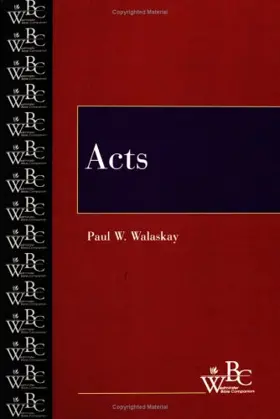

Acts
in Westminster Bible Companion
Pages
250 pages
Publisher
Westminster John Knox
Published
3/1/1998
ISBN-13
9780664252618
Reviews
Louisville: Westminster John Knox Press, 1998. Pp. xii + 250, Paperback, $26.00, ISBN 0664252613. Christopher Matthews Weston Jesuit School of Theology Cambridge, MA 02138 Volumes in the Westminster Bible Companion series are designed to aid church laypeople in their reading of the Bible. Walaskay's contribution fulfills this objective by providing thought-provoking material for its intended audience as it deals succinctly with the numerous issues, problems, and questions that arise in the reading of Luke's Acts. The twenty-one page introduction deals with the usual who, what, where, when, and why issues, with particular attention to Luke's literary style, historical context, self-perception (historian or theologian—Walaskay opts for both), and relation to charges of "anti-Semitism." The latter topic is wisely dealt with at the outset, and, if anything, Walaskay understates Luke's conscious indebtedness to Jewish tradition and its importance to his own context. The introduction potentially sends mixed messages on the genre of the book with references to Luke's use of "transcribed memories" (p. 1) and the identification of Acts as a "historical narrative" (p. 2), even as Walaskay offers the qualification that Luke's standard narrative procedure goes beyond "just the facts" (p. 11). The absence of attention to sociohistorical or sociorhetorical matters in the introduction, particularly as they relate to Luke's own Christian context, represents a missed opportunity to incorporate the insights of perceptive work done in these areas by Lukan scholars over the last several decades. Walaskay's commentary on the NRSV text of Acts is presented in ninety-six pericopes. On occasion, subheadings appear within a particularly rich section to allow focused treatment of important and complex issues.
[Full Review]
Louisville: Westminster John Knox Press, 1998. Pp. xii + 250, Paperback, $26.00, ISBN 0664252613. Robert K. McIver Avondale College Cooranbong, Australia NSW 2265 Toward the end of his introduction, Walaskay offers an explanation of his intention in writing this commentary. He points out that the Bible, and the book of Acts in particular, shares a world-view quite different from that of any modern reader. This means that our modern minds have a difficult time fully comprehending Luke's narrative. "One of the ways to bridge this gap in time is carefully to guide our historical imaginations into Luke's world in order to understand the deeds and messages of his contemporaries. Such a guided journey is one of the functions of this study" (p. 21). The tone of the commentary further grows out of the fact that it appears as part of the Westminster Bible Companion, which, as is explained in the series forward, is "offered to the church, and more specifically to the laity" (p. xi). This commentary admirably succeeds in meeting its goals of providing a guided journey for the historical imagination of the laity. A number of features indicate it is specifically directed at laity (e.g., the lack of footnotes and references to "scholars"). It is written in a style that flows naturally, and while quite rich in content, coveys all the necessary information in a natural manner. The commentary provides useful historical background where relevant. For example, thumbnail histories of Tarsus (p. 92), Damascus (p. 95), Caesarea (p. 103), and Corinth (p. 169) are provided as the narrative moves to each of these cities, as are relevant details concerning Agrippa and Bernice (Acts 25) together with their interrelationships within the wider empire (pp. 222-223), etc. Nor are the critical and exegetical issues shirked.
[Full Review]
